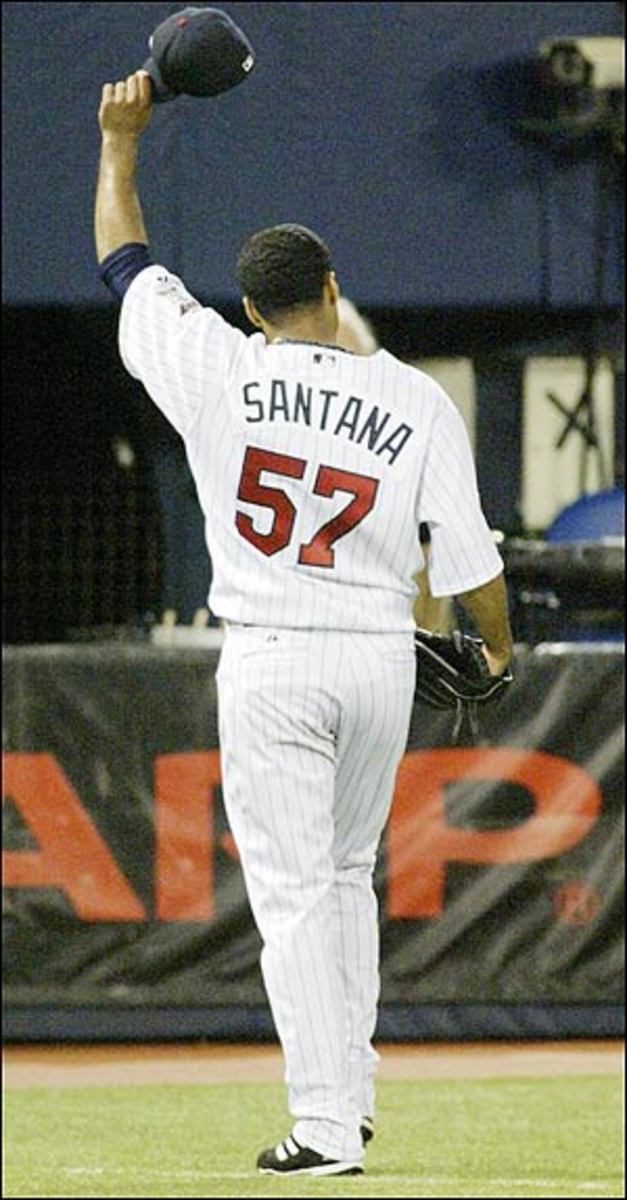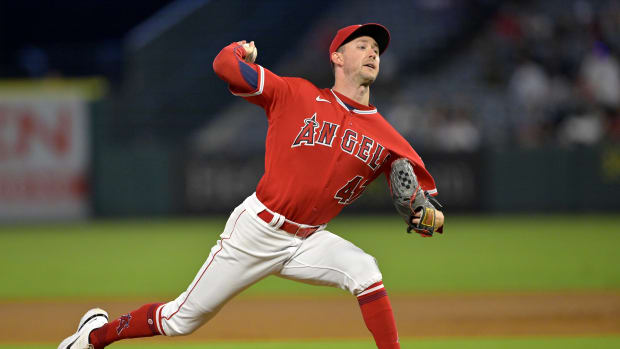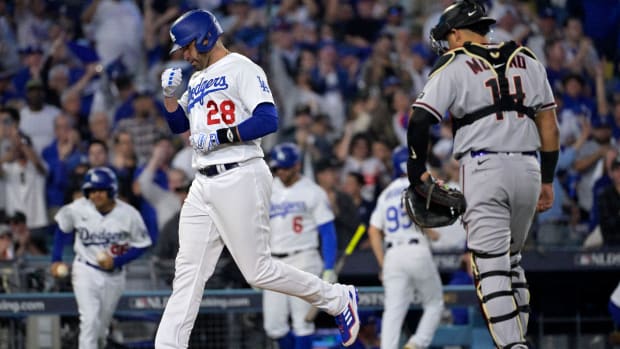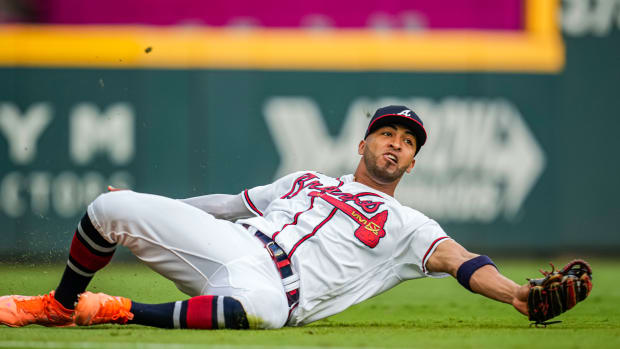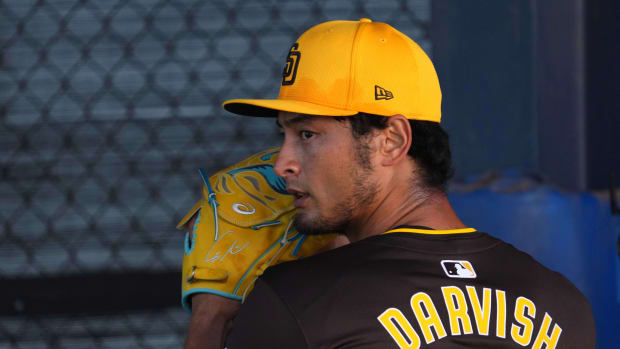Heat of the moment
Right now we're in that happy pre-consummation zone on the prospective deal between the Mets and the Twins for Johan Santana, that point where everyone's had the right number of cocktails and has that warm, tingly "I like you, I really really like you" vibe. That's ducky. Twins GM Bill Smith has been stuck with this assignment from his first day on the job, and he has assiduously wooed suitor after suitor, only to face rejection time and again. Now, after so many dances, Smith seems to have finally found his man, in the form of the always-on-the-go Omar Minaya, a 3 a.m. Mr. Goodbar if ever there was one.
There are a few cautions here, like why it's a terrible idea to give a player a no-trade clause if you might not have to. Smith wound up having to pull the trigger on some deal, any deal, lest he end up getting screwed by Santana's deadline for being dealt. Given a choice between making his player "happy" or choosing to keep his powder dry, Smith seems to be electing to end the drama. That's unfortunate, not just because of the limitations of the four Mets farmhands coming over in the deal. If Smith had decided to keep waiting, Santana could always change his mind and want out by July after another tough loss, and the packages of prospects that might be offered in a deal in the more pressurized atmosphere of late July could be better than what the Mets are offering. And given that the Twins are considered to possess as fine a collection of scouts as any other team's, settling for the draft picks wouldn't really represent a total loss for this organization. If the Twins had let Santana slip away as a free agent, those picks might have been better bets to provide the Twins something of value than the players received in this deal.
We're already hearing spin-doctoring from the many voices in the press, making a quick -- and lazy --- comparison to the Frank Viola and Chuck Knoblauch deals of yore, as if this was just another building block in some Twins master plan to contend in two or three years. The Viola trade gave the Twins real building blocks and finished products: Rick Aguilera had already been in the major leagues for four years, and was a 27-year-young veteran of obvious ability. David West was, at the time, one of the most coveted blue-chip prospects in the game, a power lefty who had blown through the Texas and International leagues; he didn't turn out quite as well as expected, but at the time he was a commodity every GM wanted. Kevin Tapani might not seem to have been as touted, but he was a top prospect out of the A's system and was tossed to the Mets as a key component in the multi-team deal that made Bob Welch an Athletic and shortstop Alfredo Griffin a Dodger. Tapani proved to be the better bet than West, shaking off a number of nagging hurts to become a classic late-developing Northern college pitcher. All three pitchers already had major league experience by the time they were dealt to the Twins, all three were immediately ready to contribute, and all three did. So far, so good -- that was a deal worth remembering fondly.
The Knoblauch deal shared one element with the Viola trade: a highly-regarded blue-chip power lefty, Eric Milton, and an equally toolsy and eventually equally disappointing shortstop, Cristian Guzman. Milton was plugged directly into the rotation, took his lumps, and never quite crossed the line between greatness promised and greatness delivered. You could argue that his greatest value to the Twins was his subsequent conversion into Carlos Silva, Nick Punto and cash, which has become Punto and... interest? Sure, there's some service time and some league-average pitching to brag about, and that's definitely worth something to a team when it's contending. It also isn't quite as brag-worthy as Aguilera and Tapani. Milton was a good mid-rotation starter on one Twins division-winning team, and Silva was as well (and was a menace to the fortunes of a second). Guzman arrived without any upper-level experience, played his age-20 season in Double-A and struggled, got promoted to the Show anyway, and then gave the Twins one good year and several seasons' worth of disappointment before becoming a contractual millstone in Washington. Meanwhile, Knoblauch was an important part of the Yankees' winning three straight World Series. This seems a lot less like something you'd want to cite as a great moment in Twins history, or evidence of canny deal-making, and while the Twins have derived benefits from the deal long after Knoblauch's career has ended, it doesn't really add up to a pile of unambiguous goodness.
Which brings us to the Santana deal, which may provide the Twins with something to build on, or it might be a brick thrown up by Smith out of increasing desperation to get Santana dealt. I'm not impressed with the Mets prospects in this trade. Carlos Gomez is a good, not great, center-field prospect. In a winter where a lot of center-field prospects changed hands, he's not as talented as Elijah Dukes, or Lastings Milledge, or Cameron Maybin. I'd rather have Gorkys Hernandez. Gomez is probably not ready for a regular job in the majors, and while he's fast and young he's also not especially patient, nor will he hit for much power. His top comparables on his PECOTA? David Green (a blowout blue-chipper), Willie Cañate and Luis Matos. That's excitement, that Green, one of the all-time Brad Komminsk-level prospect disappointments of the '80s, might be his up-side, even allowing for Green's self-destructive drinking and Gomez's presumably better habits.
Then there's the pitching, and that's... not quite as exciting as anything the Twins got in the Viola or Knoblauch trades, certainly. Phil Humber looks like a maybe who might grow up to be a fourth starter on a team that will need a really good front three to contend; he has at least appeared in the major leagues -- and pitched poorly. Kevin Mulvey is coming off of a decent year in the Eastern League, but he's a short right-hander without a lot of upside. Deolis Guerra is a toolsy teen with decent command, and he didn't sink facing older competition in the Florida State League. I don't think we can really call him the sleeper in the deal, but he's the one with the best chance at making Smith feel good about this trade in 10 years, and it's not a very big best chance. As much as the standards have changed in terms of how readily available top talent may be these days relative to the days when Viola or Knoblauch were being shopped, it's a pretty mediocre package.
There's also the more general question of what the Twins are doing trading for other people's pitching prospects when they already have one of the best assemblages of young pitching around. The pitchers added aren't really any better than what's already in Minnesota's system, so while Smith seems to believe there's always room for more, his getting three more pitching prospects is sort of like buying three more apples to eat next month when you already own an orchard. And not especially high-end, organic, worm-proof $3-a-pound apples, either. Pitching talent comes with a built-in spoilage rate; adding more might seem to be wisdom, but given the modest merits of the guys added, it might also just make sure that Rochester's stocked with people somebody else drafted. It would have been nice to add position-playing prospects, but I'm less inclined to bang on the Twins in this regard, given that their lineup is already mostly stocked with young talent. Adding Gomez doesn't really help or hurt, it just presents an indictment of their fascination with Denard Span.
Is it fair to bang on the Twins for getting so little for what they might define as "just one year of Johan Santana"? Well, for the Mets it's going to be worth a lot more than that, since they're effectively acquiring the right to exclusively negotiate a multi-year extension with the game's best starting pitcher without that pesky free-market doing anything more than providing a point of reference. They won't miss the prospects, and it's a credit to the organization that they managed to prop up the value of the quartet effectively enough to swing a deal that you'd think the Mets would be entirely out-gunned on, certainly compared to what the Yankees, Red Sox, Mariners or Dodgers would be able to use to acquire a quality starting pitcher. While there have been a lot of overly optimistic propositions about what the Yankees or Red Sox put on the table, just about any of their more realistic packages involved one prospect better than anyone the Mets offered, and perhaps had to offer.
What's even more impressive, however, is that this was the sort of move that the National League has been short on this winter. Where most of the wide field of contenders in the senior circuit have settled for modest deals that fix one discrete problem or another, no one has really propelled themselves ahead of the pack with a bold stroke. The American League has seen the Tigers playing for high stakes to try and run with the Indians, Yankees and Red Sox; the National League has the Astros' kamikaze run, or the Dodgers spending big to sort of address last winter's Juan Pierre screw-up. One line of thought is that this somehow maintains "parity" in the NL East, because the Braves got Tom Glavine, and the Phillies are almost sorta kinda hooked up with Pedro Feliz, and... yeah, I don't buy this argument, either. Picking between the best starting pitcher in baseball or what's left of Glavine's career isn't really very hard if you're the Mets, and the kicker is that you get the benefit of Glavine's return to your division rival to watch his playing days end in a Braves uni while you get Santana. That's addition by addition and subtraction for the Mets, because it's a case of the Braves committing a big chunk of their budget for this season to a veteran who might provide them with mid-rotation adequacy, and who might not.
Instead this is the first deal in the NL where you could argue that a team is not just gunning for the division and not just establishing an easy favorite to win the pennant, as the Mets now have a shot at having a team that can go toe-to-toe with the AL's titans. It is exactly the sort of move that Minaya needed to make after last year's fold-up, and the sort of late-winter genius created by contingency -- six weeks ago no one expected the Yankees and Red Sox to just walk away, and unless the Dodgers or Mariners had decided to play for high stakes and deal out of their storehouse of top talent, no one else really had the sort of stuff to overawe any other bidder. With those four out of the running Minaya had an opening, and in their last-minute desperation the Twins proved too willing to agree to anything.






























